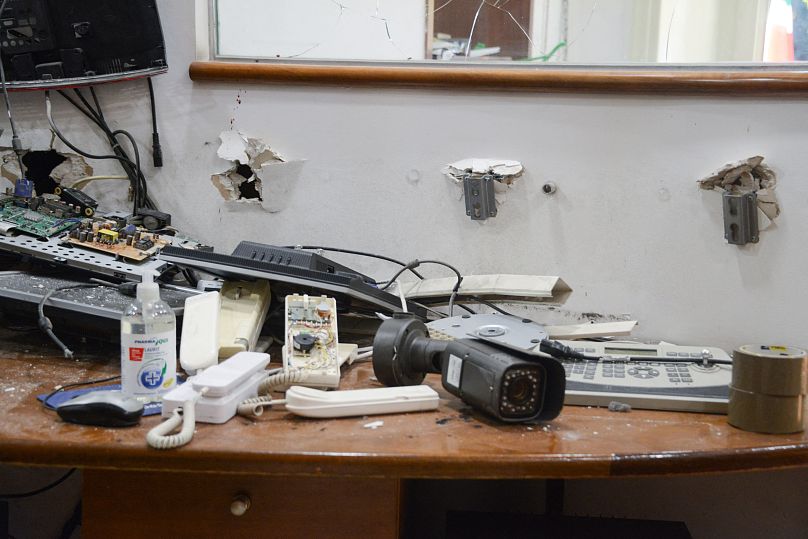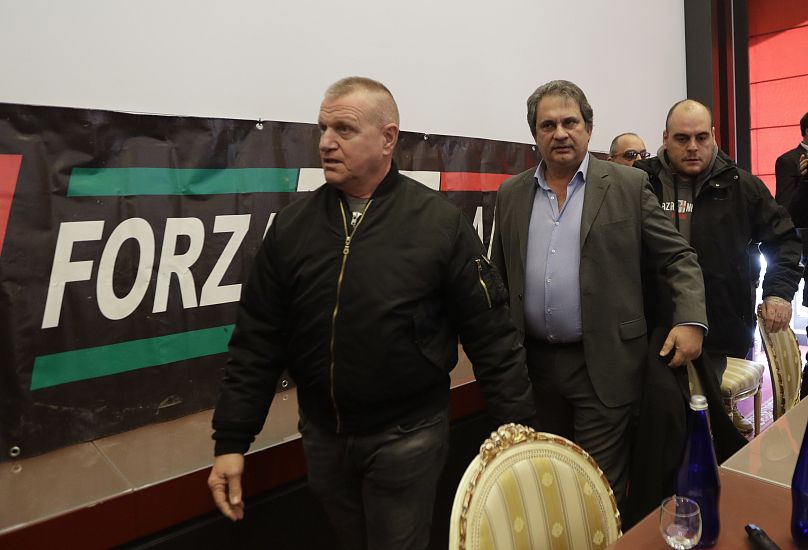Violence at the end of a COVID pass protest in Rome reminded some of Italy's fascist era. Others have rejected such comparisons, calling them an exaggerated conflation.
When protests in Rome against extending Italy's COVID pass to all workplaces turned violent, it reopened a dark chapter in the country's history.
As the demonstration spiralled out of control on October 9, a mob smashed up the headquarters of a trade union.
For some, it was a reminder of the 1920s and the birth of fascism, which saw Benito Mussolini gain power through a coup d’état and wage war on trade unions. This, coupled with the arrest of Roberto Fiore -- the leader of a small neo-fascist party -- as the protests turned violent, sparked a debate about whether fascism is on the ascendancy.
For others, however, such claims are an exaggerated conflation designed to distract from what they consider to be the real issues at hand -- namely their concerns over Italy's COVID pass and its alleged infringement on their rights.
What is Italy's Green Pass and why is it controversial?
Italy's Green Pass was rolled out in August. It provides proof that someone has either been vaccinated against COVID-19, has recovered from the disease in the last six months or has tested negative for the disease in recent days.
It has been required for dining indoors, visiting museums and theatres and on long-distance trains.
But, from Friday (October 15), it's been mandatory in all workplaces, even for those who are self-employed.
Employees refusing to comply with the scheme risk fines of up to €1,500. Employers can also face financial penalties if they don't carry out the appropriate checks.
It means unvaccinated workers will have to cough up for regular COVID tests in order to access their workplace. Although such employees are protected from dismissal, they risk suspension and a pay freeze if they miss more than five days of work for Green Pass-related reasons.
With more than 80% of Italians over the age of 12 fully vaccinated, the Green Pass has been largely welcomed.
But it has also generated a significant degree of controversy. Politicians from the centre-right bloc (mainly formed of the populist Northern League and the nationalist Brothers of Italy) have accused it of undermining individual freedoms and being damaging to the economy.
Brothers of Italy leader Giorgia Meloni – whose party is currently edging towards the top spot in opinion polls – has said the Green Pass scheme was an “ineffective and economy-killing measure that damages [Italy’s] tourism".
Also concerned is the Italian General Confederation of Transport and Logistics, who warned goods deliveries could decrease by a third under the new Green Pass rules.
In recent weeks there have been a growing number of large protests against the extension of the COVID pass to workplaces. The most controversial was in Rome on October 9. It saw approximately 10,000 people gather in the city’s huge Piazza del Popolo. There was vandalism and violent scuffles after the crowd had dispersed.
Italy and fascism: an enduring influence?
Italy's fascist leader Benito Mussolini came to power in 1922 and later brought the country into World War II as an ally of Nazi Germany.
At the end of the war, Italy attempted to deal with this period of its history by banning the creation of new fascist parties. Then, in 1952, Christian Democratic Prime Minister Mario Scelba introduced a law banning apologists for Italy's fascist regime or its propaganda, with penalties including a fine between €206 and €516, or six months to two years of imprisonment.
In spite of such legislation, neo-fascist groups continue to exist in Italy, and numerous scholars and critics have accused various politicians, even on the moderate right, of revisionism when addressing the country’s fascist era.
Matteo Salvini, leader of the Northern League and former Deputy Prime Minister, has repeatedly undermined the significance of fascist vestiges in Italy, deeming fascism something “of the past” that “will never come back” and that has been “defeated by history”.
Among those demonstrating against the Green Pass scheme in Rome last Saturday were members of Forza Nuova, a minor neo-fascist party founded in 1997. Its leader, Roberto Fiore, was among those arrested amid the violence. Their presence sparked accusations from critics who claimed the Green Pass protests were infiltrated or spearheaded by the far-right.
'Not enough has been done'
Viewing the October 9 violence as a symptom of a ballooning far-right threat needing to be stamped out, numerous commentators and politicians have called for fascist movements like Forza Nuova to be shut down.
“What happened [on October 9] was an unprecedentedly troubling incident,” Gianfranco Pagliarulo, the president of the National Association of Italian Partisans (ANPI) told Euronews. “We haven’t seen such a violent attack since the end of the war. You’d have to go back to the 1920s to witness the squadristi [fascist militias] looting offices and committing crimes of a similar nature.”
The ANPI was founded by Italian resistance fighters in 1944, as the war was coming to a close. Over the course of nearly eight decades, the association has been at the forefront of anti-fascist activism in the country.
For Pagliarulo, Saturday’s violent scuffle has much deeper roots.
“Not enough has been done," he said. "Over the past thirty years, governments have underestimated the rising power of extreme right-wing movements, which have not only become significant political forces but have also influenced major parliamentary parties.”
Concurring with Pagliarulo’s sentiment is Simone Alliva, a progressive journalist and author, who writes about LGBT+ rights. Speaking to Euronews, he claimed the rising threat of the far-right is at the heart of Italian society.
“The neo-fascists haven’t infiltrated these anti-Green Pass protests, but have been a part of them from the start. You have neo-fascists who have found their shelter in large and moderate parties, like the League and Brothers of Italy.”
For Mattia Santori, head of the anti-populist Sardines – the grassroots movement which made headlines back in 2019 when it took a stand against Matteo Salvini – the only solution to such a rising far-right presence is to take clear action.
“There can be no half-measures on the clear-cut stance against these attacks on the stability and values of our country,” Santori told Euronews. “Democratic and anti-fascist forces must clamour together for the dissolution of Forza Nuova, of all the extreme right-wing groups which have made the apology of Fascism their bulwark.”
“Nazism takes hold in times of crisis,” Pagliarulo concluded. “And while we aren’t in the middle of war anymore, we’re living in a crisis caused by the post-2007 recession and COVID. In the midst of this malaise, Fascists have emerged triumphant.”
'Fascist violence a red herring'
For many, most prominently – albeit far from exclusively – on the political right, the power of neo-fascist forces in Italy has been overstated and represents a distraction from what they consider to be valid criticisms of the country’s Green Pass scheme.
Umberto La Morgia, a former councillor for the Northern League and now a member of the Brothers of Italy, condemned the violence but deemed its ideological nature to be irrelevant.
“While the troublemakers at the protest in Rome were openly neo-fascist, the scuffles that occurred in similar protests in other Italian cities were orchestrated by communist and anarchist groups,” La Morgia told Euronews – echoing a similar statement made by Giorgia Meloni. Indeed, anarchist supporters have been found at protests across Italian cities and were around half of the 57 arrested at a demonstration against the Green Pass in Milan recently.
La Morgia says the fascist violence is a red herring. The fact the Green Pass conflicts with "certain constitutional rights and creates an important precedent” is more worthy of attention.
“It’s certainly true that tiny neo-fascist and criminal groups are trying to exploit the Green Pass-related social discontent as a way to boost their media profile,” he added. “But I do not believe that fascism has any real influence in Italy today. Those groups have nothing to do with the institutional Italian right.”
La Morgia insisted the “institutional right” to which he belongs is void of any fascist links. However, he is currently on the electoral committee of Rachele Mussolini, the granddaughter of fascist dictator Benito Mussolini. Rachele once claimed to carry her last name “with pride”. In a blog post from earlier this month, La Morgia said voters did not pick Rachele “because of her surname… but in spite of it”. Nevertheless, critics have viewed her electoral success – ranking as Rome’s most popular municipal candidate – as symptomatic of the enduring appeal of fascist imagery and politics in Italy.
Within the movement opposing the Green Pass, many have openly distanced themselves from any fascist associations, and have even decried such links as media constructions intended to sow discord among the public.
Students Against the Green Pass (Studenti Contro Il Green Pass), a youth movement with over 20,000 followers on Facebook, is one such organisation. It resists any associations with far-right politics.
Gloria Mancini, a spokesperson of the group, told Euronews that the organisation “does not accept that the anti-Green Pass movement should be conflated with fascism”. She further asserted that any such associations are exaggerated fabrications of the press intended to “exacerbate tensions and to discredit a sacrosanct battle that we, as a student movement, have conducted in an entirely non-violent manner”.
Guido Cappelli, a Professor of Italian literature at Naples Eastern University and a vocal critic of the Green Pass scheme, went even further, telling Euronews that it was “prejudicial” to speak of a “significant neo-Fascist presence” at anti-Green Pass marches – a presence which he described as “a few hundred or so idiots”.
Every weekday, Uncovering Europe brings you a European story that goes beyond the headlines. Download the Euronews app to get a daily alert for this and other breaking news notifications. It's available on Apple and Android devices.













